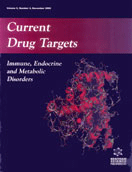Abstract
Heterotrimeric G-protein-coupled receptors (GPCRs) mediate a wide variety of organismal functions ranging from vision, olfaction, and gustation to the development and physiology of the cardiovascular, neuronal, and immune system. Naturally they are targets of a large number of therapeutic drugs. The regulators of G protein signaling (RGS) are a family of diverse proteins that regulate the GPCR-mediated signaling pathways principally by acting as GTPase activating proteins (GAPs) for the α subunit of the heterotrimeric Gproteins. Certain members of the RGS family contain multiple domains and motifs that mediate interactions with other signaling molecules, thus linking GPCR-dependent and GPCR-independent signaling pathways. Because of their ability to fine-tune vital GPCR-mediated processes and recent findings linking them to brain disorders, retinitis pigmentosa, and cancer RGS proteins have become excellent candidates for new drug discovery. The focus of this review is to discuss the roles of the RGS proteins in the development and normal physiology of cardiovascular and immune system, and to explore their potential as drug targets useful for the treatment of pathological conditions of the cardiovascular and immune systems.
Keywords: rgs, heterotrimeric g protein, drug targets, cardiovascular function, immune function



















